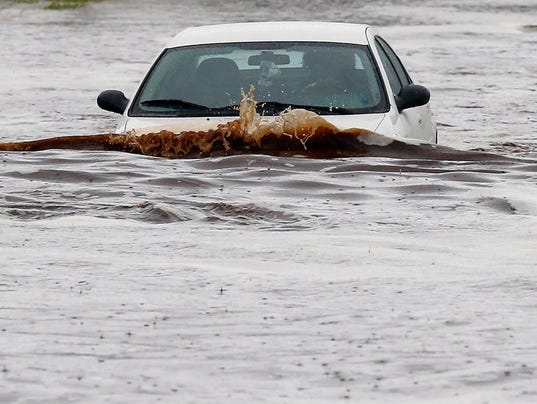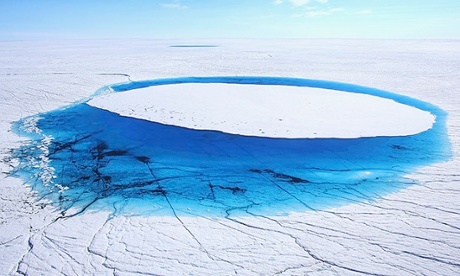 Torrential rain from the remnants of a Pacific Ocean hurricane swamped the Desert Southwest Monday, with Phoenix and Tucson seeing some of the worst flooding.
Torrential rain from the remnants of a Pacific Ocean hurricane swamped the Desert Southwest Monday, with Phoenix and Tucson seeing some of the worst flooding.
In Phoenix, the rain turned freeways into lakes and forced the closure of highways, streets and schools throughout the region. In Tucson, one woman died after her car was swept away by heavy floods and became trapped against a bridge.
Monday was the rainiest single day in the history of Phoenix, where weather records go back to 1895.
Record rainfall swamps Phoenix
The Disaster That No One Is Talking About
 Three millimeters, about one-eighth of an inch, may not sound like much. But when it’s the height water is steadily rising outside your doorstep every year, it may as well be three feet if it’s anything at all.
Three millimeters, about one-eighth of an inch, may not sound like much. But when it’s the height water is steadily rising outside your doorstep every year, it may as well be three feet if it’s anything at all.
On the eastern shores of Maryland, ocean levels are climbing by at least this much — nearly two times the global historic average, according to the state’s Department of Natural Resources — and those waters are pushing several small fishing communities to the brink of extinction. Photographer Greg Kahn set out to capture what it’s like for these sinking towns in his new series “3 Millimeters.”
Global warming is already here and could be irreversible, UN panel says
 Global warming is here, human-caused and probably already dangerous – and it’s increasingly likely that the heating trend could be irreversible, a draft of a new international science report says.
Global warming is here, human-caused and probably already dangerous – and it’s increasingly likely that the heating trend could be irreversible, a draft of a new international science report says.
The United Nations’ Intergovernmental Panel on Climate Change on Monday sent governments a final draft of its synthesis report, which combines three earlier, gigantic documents by the Nobel Prize-winning group. There is little in the report that wasn’t in the other more-detailed versions, but the language is more stark and the report attempts to connect the different scientific disciplines studying problems caused by the burning of fossil fuels, such as coal, oil and gas.
America's biggest PR firm formally declares it will not accept climate denial campaigns
 Edelman, America’s biggest public relations firm, has for the first time formally declared it will not take on campaigns that deny global warming, in response to an investigation by the Guardian. However it is unclear on its commitment to existing clients that have been involved in spreading doubt about climate change and fighting regulations to cut carbon pollution.
Edelman, America’s biggest public relations firm, has for the first time formally declared it will not take on campaigns that deny global warming, in response to an investigation by the Guardian. However it is unclear on its commitment to existing clients that have been involved in spreading doubt about climate change and fighting regulations to cut carbon pollution.
The explicit rejection comes in response to a story earlier this week that saw a number of top firms in the industry – but not Edelman – declare as a matter of company policy that they viewed climate change as a threat, and that they would not take on clients or campaigns that deny climate change.
Fracking 'a huge load of hype', say Friends of the Earth
The government claims that tight restrictions in the new licences that have been made available to frack for shale gas across vast sheaths of the UK means areas of outstanding natural beauty and national parks will not be drilled, unless there are 'exceptional circumstances'.
A number of incentives to help kick-start the industry have also been included including tax breaks, payments of £100,000 per site plus a 1% share of revenue to local communities.
Fire at fracking fluid storage site in North Dakota sparks concerns
-North Dakota's Health Department said it's surveying air quality near the site of a fire at an industrial park in Williston, the heart of the state's oil patch.
Chemicals used in hydraulic fracturing caught fire at an industrial warehouse in Williston. Officials said they're going to let the fire burn out on its own because pouring water on the blaze would create a secondary problem for nearby waterways.
Scientist: "We Are Living in the Steroid Era of the Climate System"
 June 2014 has become the second consecutive record-setting month for heat, the National Oceanic and Atmospheric Administration announced Monday. The averge global temperature last month was 61.2°F (16.2°C), which is 0.2°F than 2010, the previously hottest June, and 1.3° degrees higher than the 20th century average. It is the 352nd hotter than average month in a row.
June 2014 has become the second consecutive record-setting month for heat, the National Oceanic and Atmospheric Administration announced Monday. The averge global temperature last month was 61.2°F (16.2°C), which is 0.2°F than 2010, the previously hottest June, and 1.3° degrees higher than the 20th century average. It is the 352nd hotter than average month in a row.
Derek Arndt, NOAA's climate monitoring chief, said unusually hot oceans — especially the Pacific and Indian oceans — were the driving force behind June's heat.
"We are living in the steroid era of the climate system," Arndt said.
More Articles...
Page 39 of 202

 Environmental Glance
Environmental Glance






























